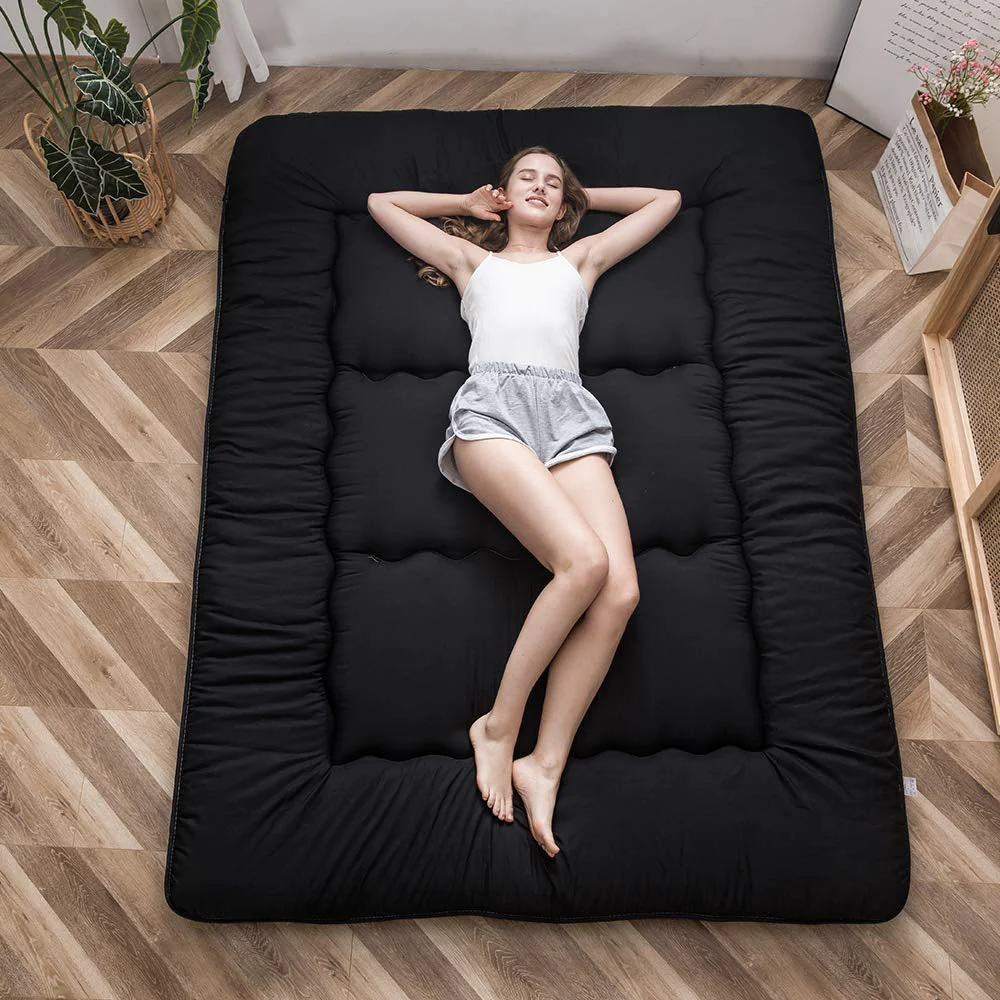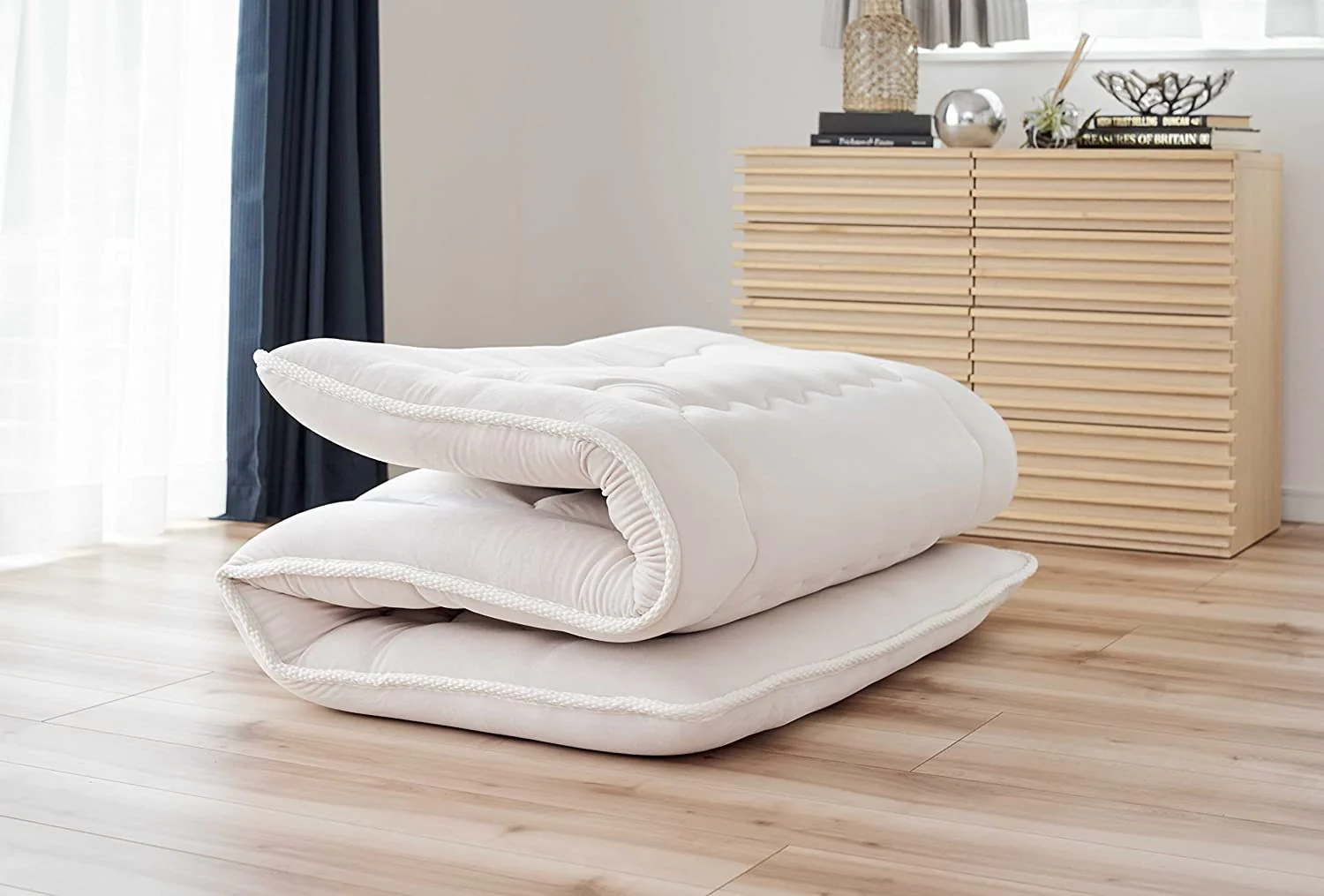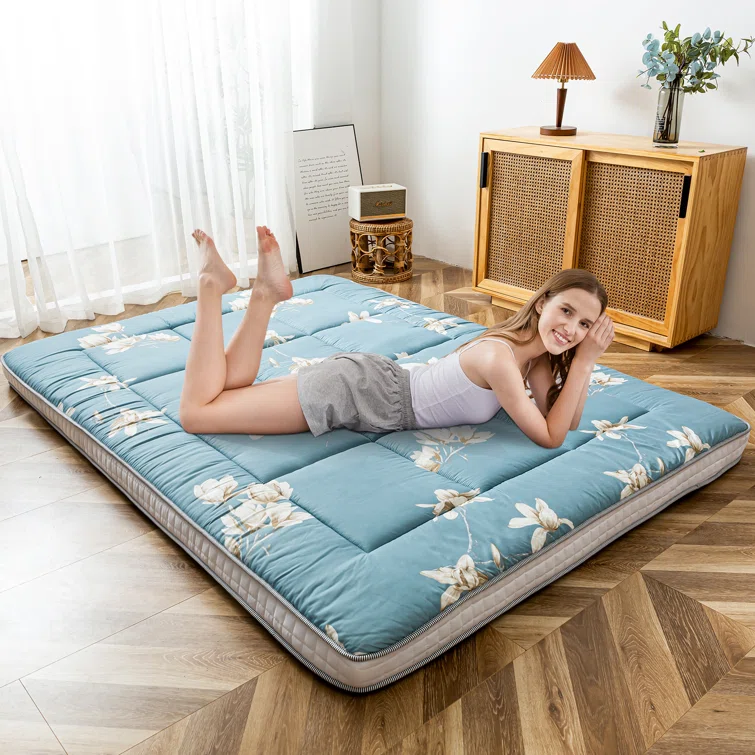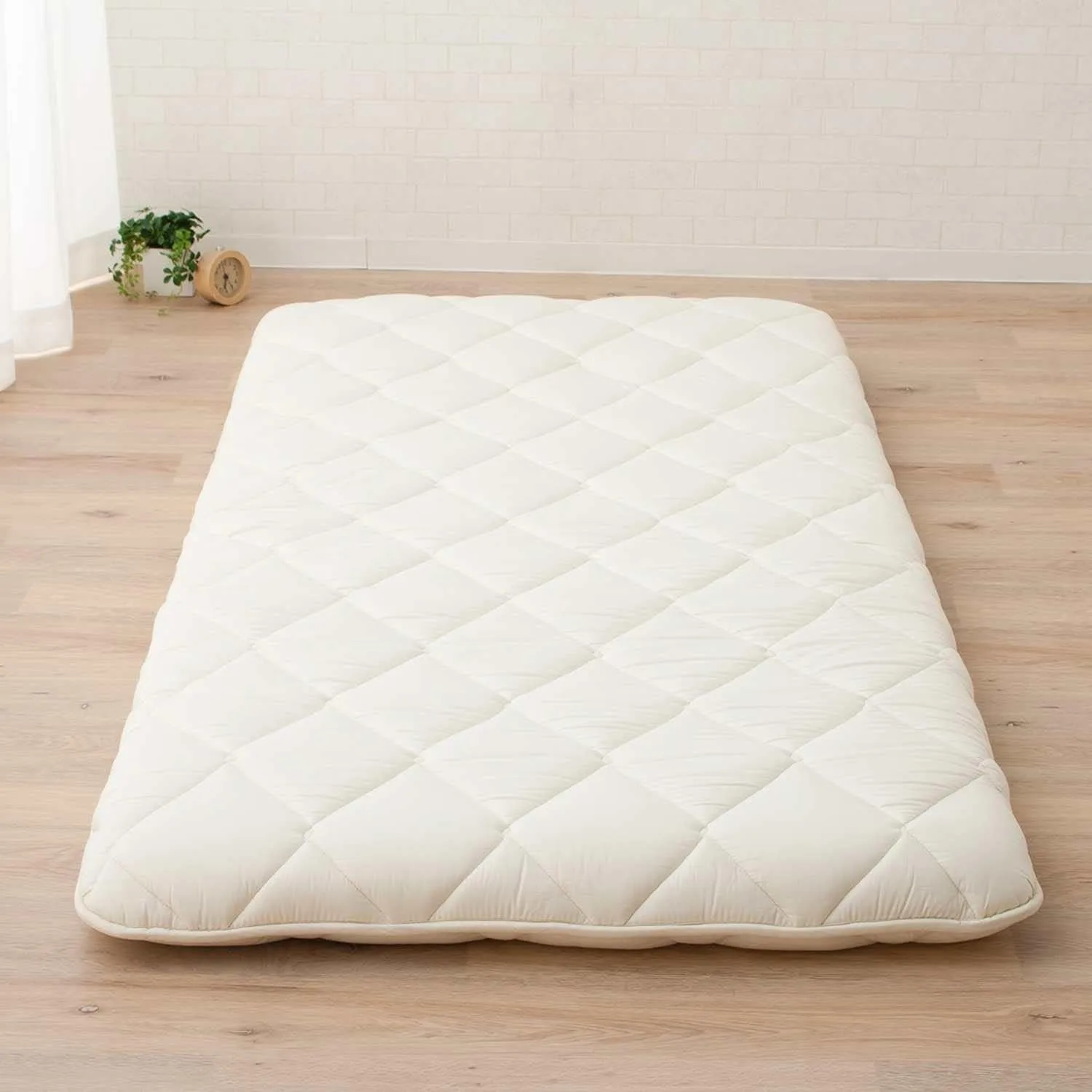A futon is a bed that transforms into a couch in seconds, offering cozy slumber and stylish seating in one. This space-savvy solution is for anyone who craves versatility in their living space.
Futons vary in size according to your demands, which sets them apart from other alternatives like daybeds and sofabeds.

What is a Futon Mattress?
In the seventeenth century, the Japanese futon was a luxury item reserved for the aristocracy. It’s a firm mattress filled with cotton, wool, or synthetic fibers.
It is intended to be rolled up when not in use and spread out on the floor for sleeping. In Japan nowadays, traditional futons are still a practical and well-liked option because most Japanese households are usually smaller.
Construction of Futon Mattress
Futon mattresses’ outer surface is usually made from materials such as polyester or cotton, and it has to be easy to fold up and converted into a couch, meanwhile, some futon mattresses use in their filling traditional foam or tiny innerspring for extra support.
They also come in a variety of sizes to fit every sleeping preference, if you want to know more about futon mattress sizes check out the article Futon Mattress Sizes Explained.

Types of Futon
Traditional Futons
The traditional futon mattress is a cotton or wool blanket that can be rolled up and put away when not in use. There are no innersprings in this kind of mattress. However, it features many comfort layers for cushioning and comfortability.
Western Futons
Western Futon mattresses include metal coils and a wooden frame, and compared to the traditional Japanese futon, it is more supporting and thicker, thus it is a better fit for sleeping.
Folding Futons
A folding futon mattress is a tiny, portable mattress that is perfect for room sharing. It is constructed from several materials, including latex, foam, and cotton.

Pro of Futon Mattresses
Affordable
A futon frame and mattress could be purchased for less than $1,000.
Unlike standard mattresses which may cost up to $1000, without accounting for the bed frame and any additional element, futon mattresses are way cheaper and it is a great option if you have a tight budget or don't want to spend a lot of money on a guest bed.
Keep in mind that futon mattresses’ cost will vary depending on the design and the quality of the material.
Firm
The thickness of Futon mattresses ranges from three to nine inches tall, which is not as thick as regular mattresses, which is understandable because Futon mattresses have to be thin to fold into position.
This makes them very firm as a result of their shorter profile, which should be ideal for stomach sleepers or anyone who prefers a harder surface. Although certain foam futon mattresses may conform to your body, a futon mattress will likely be stiffer than what you would find on a regular mattress.
Portability
It can be difficult to move a mattress, particularly if it has several components, but futon mattresses are more maneuverable and portable, as the minimal size and foldability of futon mattresses make moving them easier.
Compact
A futon is a great way to make the most of the space in your college dorm or studio apartment. It gives you more space to move about and provides additional seats for guests because it can be turned from a bed to a couch.
Offers room for visitors
Futon mattresses are perfect if you have guests staying overnight, It's an easy way to have a place to sleep wherever you need it. Additionally, a futon mattress is typically more comfortable than an air mattress that isn't supportive or firm enough.
Cons of Futon Mattresses
Not Durable
Futon mattresses are best used as a temporary sleeping solution or as a guest bed that is seldom used.
As a futon is used more frequently, the mechanics that enable it to transform from a seat to a bed may deteriorate over time. In contrast, a futon mattress can last up to 10 years with light use; however, it will only last up to 5 years if you sleep or sit on it frequently.
Lack of Support
A futon mattress is firmer due to its short profile, but this does not always indicate that it is better at supporting heavy weights.
Standard mattresses are constructed from many layers of dense foam to relieve pressure points from tension, support your complete body, and maintain your natural spine alignment, so if you prefer a softer mattress you might want to reconsider making a futon your primary sleeping mattress.
Basic Design
Western futon mattresses have changed in appearance over the past few decades, although they still primarily resemble traditional mattresses. Their simple, unadorned appearance might not fit the aesthetic of your house and could seem quite strange in a public setting.
Get a Futon Mattress if:
- You have limited space: Futon mattresses can be folded and converted into seats and sofas, which makes them easily utilized in limited spaces
- You often have guests: Futon mattresses offer temporary sleeping solutions if you have guests staying overnight and you need to arrange sleeping accommodations for them, as you will just need to unfold it and it will be ready to be slept on.
- You are budget-conscious: Futon mattresses are some of the most affordable mattresses in the market, so they’re a great choice if you’re on a budget.
- You are a back or stomach sleeper: Back and stomach sleepers most often prefer firmer surfaces to provide support and maintain their natural spine alignment, which makes futon mattresses a great choice for them.
Avoid Futon Mattresses if:
- You are heavy: Futon mattresses are typically very thin, so they won’t provide enough support for heavier weights and could decrease the overall quality of their sleep.
- You suffer from back or joint pain: Unlike standard mattresses, Futon mattresses don’t have many layers of dense foam to alleviate the constraint from pressure points, so a pressure build-up might occur especially if you’re on the heavier side.
- You are a hot sleeper: Futon Mattresses doesn’t have any temperature regulating features, which might be an issue for hot sleepers who tend to overheat during the night.
How to Choose a Futon Mattress?
Size
There are several different sizes of Futon mattresses, including twin, full, queen, and king.
Twin-size futons are typically the smallest in size as it’s designed to accommodate one person, while full and queen-size futon mattresses are great for couples.
If more than 2 people are going to sleep on the futon mattress, then it’s better to consider the king or the California kind sizes.
Purpose
Is the futon mattress going to be your primary sleeping mattress, or you’ll be using it on certain occasions?
Futon mattresses’ intended usage should be the focal point of the selection process, choose a mattress that best meets your sleeping demands if it will be used as a bed or a convertible bed for most of the time. If you’ll just sleep on it sometimes, you should also consider choosing a mattress that will make you feel comfortable when sitting.
Firmness and Sleeping Preferences
Your sleeping preference plays an integral role in choosing the mattress, those who know if they sleep on their side, stomach, or back might assist them in choosing the perfect mattress for them.
Generally speaking, side sleepers want soft to medium-soft mattresses, whereas stomach sleepers like firmer mattresses, and back sleepers often need mattresses with modest support, which makes futon mattresses great for back and stomach sleepers, but might be too firm for side sleepers.
Weight
If you're lightweight (130 pounds or less) then a futon mattress will be great for you, and you won’t experience any pressure build-up across every sleeping position.
If you're average weight (from 130 to 230 pounds), you’re also going to enjoy futon mattresses unless you’re a side sleeper, as you might experience joint pain and muscle soreness when you wake up.
If you’re a heavy sleeper (230 pounds and more), then a futon mattress is not ideal for your weight range, especially if it’s your primary sleeping surface, and it’s recommended to find a mattress that offers more support.
Budget
Even though Futon mattresses are some of the most affordable mattresses on the market, you should assign a set budget for your mattress, as the high-end options might be a lot price, than regular ones.
The price of the mattress depends on the materials used in its construction.
FAQ
Is a Futon Mattress comfortable to sleep on every night?
This depends on your sleeping preference and what you require to feel comfortable at night. A futon mattress can be exactly what you need to get a good night's sleep if you prefer a firmer sleeping surface, however, A standard mattress is more popular due to its increased variation in firmness, structure, and materials.
How long does a Futon Mattress last?
The quality and usage pattern of a futon mattress will determine how long it lasts. The average lifespan of a futon mattress is 5 to 10 years but with proper care and maintenance, they could last longer.
Does a Futton Mattress come with fitted sheets?
No futon mattresses will require purchasing separate bedding sheets.
Deep pocket sheets are a suitable option if your futon mattress is on the thicker side.
What’s the difference between a Futon Mattress and a regular mattress?
Because a futon mattress is designed to be folded and be converted from a seat and a bed, it is firmer and thinner than a regular mattress, it’s typically three to nine inches thick, and it often contains foam, springs, or a mix of the two.
Standard mattresses come in a greater variety of materials, such as memory foam, latex, and temperature-regulating fibers, and may go up to 14 inches, A standard mattress is also more durable and designed for long-term use.
Should you flip a futon mattress?
Yes, Futon mattresses should be flipped every six to eight months, after that you should turn your futon mattress once a month. It should also be rotated every seven to ten days.
Can you make a futon more comfortable?
Some of the easiest and most efficient options to make futon mattresses more comfortable are adding memory foam toppers, or additional pillows or blankets to the futon, THIS will provide extra support, and balance out the firmness of its surface.
How Firm is a Futon Mattress?
In general, futon mattresses are firmer than regular mattresses, because for these mattresses to function as a bed and a sofa, they must be thin, or else they won’t fold, On the other hand, the mattress and the kind of frame you have will also determine how firm the mattress is overall.
The firmest options for futon mattresses are the ones that are made of regular foam, followed by memory foam mattresses, which are better at adjusting to your body.
Conclusion
A futon is a lightweight, flexible piece of furniture that may be used as a sofa or folded into a bed. It is straightforward and practical. This makes it a great substitute for anybody looking for versatile furniture, however, it’s not designed for daily use and might be too firm for some sleeping preferences, but it offers a great temporary sleeping solution.
Jessica H.
Jessica is a reviewer, writer, and sleep enthusiast at Sleepiverse. Jessica graduated with her master's degree in Nursing research and education. She is a registered nurse and currently works in the Intensive Care Unit. Since becoming a nurse, Jessica has worked the night shift, which means a disrupted sleep schedule. Knowing she needed to function at her best while caring for patients at night, she spent a lot of time researching how to sleep well with a difficult schedule.


